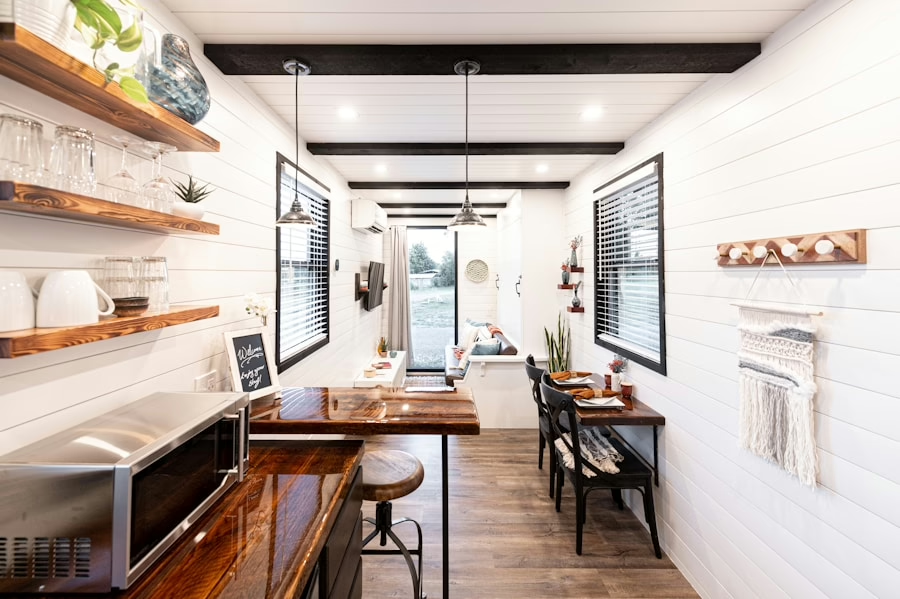Sustainable simplicity, often encapsulated in the philosophy of minimalist living, emphasizes the intentional reduction of material possessions and distractions in one’s life. At its core, minimalist living advocates for a lifestyle that prioritizes quality over quantity, encouraging individuals to focus on what truly matters. This approach is not merely about decluttering physical spaces; it extends to mental clarity and emotional well-being.
By stripping away the excess, individuals can create an environment that fosters peace, creativity, and purpose. The principles of minimalist living are rooted in mindfulness and intentionality. This means being conscious of the items we bring into our lives and the activities we engage in.
Minimalism encourages individuals to evaluate their possessions and commitments critically, asking whether they add genuine value or joy. This practice can lead to a more fulfilling life, where each item and experience is cherished rather than taken for granted. Ultimately, sustainable simplicity is about aligning one’s lifestyle with personal values and environmental consciousness, creating a harmonious balance between self and surroundings.
Key Takeaways
- Sustainable simplicity promotes a minimalist lifestyle that can transform both personal lives and the planet.
- Understanding the principles of minimalist living is essential for embracing sustainable simplicity.
- Minimalist living has a positive impact on personal well-being and mental health, reducing stress and promoting mindfulness.
- Embracing minimalist living reduces environmental footprint and promotes sustainability by consuming less and reducing waste.
- Practical tips for embracing minimalist living in everyday life include decluttering, mindful consumption, and conscious decision-making.
The Impact of Minimalist Living on Personal Well-being and Mental Health
Adopting a minimalist lifestyle can have profound effects on personal well-being and mental health. Research has shown that cluttered environments can lead to increased stress and anxiety levels. By minimizing physical possessions, individuals often experience a sense of relief and clarity.
A tidy space can promote a calm mind, allowing for better focus and productivity. Furthermore, the act of decluttering can be therapeutic, providing a sense of accomplishment and control over one’s environment. In addition to reducing stress, minimalist living encourages individuals to cultivate deeper connections with themselves and others.
By prioritizing experiences over material goods, people often find greater satisfaction in relationships and personal growth. Engaging in meaningful activities—such as spending time with loved ones or pursuing hobbies—can enhance overall happiness. This shift in focus from accumulation to appreciation fosters a more positive mindset, ultimately contributing to improved mental health and emotional resilience.
How Minimalist Living Reduces Environmental Footprint and Promotes Sustainability
Minimalist living inherently promotes sustainability by encouraging individuals to consume less and make more thoughtful choices regarding their possessions. The environmental impact of consumerism is significant; the production, transportation, and disposal of goods contribute to pollution, resource depletion, and climate change. By adopting a minimalist approach, individuals can significantly reduce their ecological footprint.
This reduction is achieved through conscious purchasing decisions, such as opting for high-quality, durable items that are designed to last rather than disposable products that contribute to waste. Moreover, minimalism encourages a shift towards sustainable practices such as recycling, upcycling, and supporting local businesses. When individuals prioritize quality over quantity, they are more likely to invest in products that are ethically sourced and environmentally friendly.
This not only benefits the planet but also supports a circular economy that values sustainability over short-term gains. By embracing minimalist living, individuals can play an active role in promoting environmental stewardship and fostering a healthier planet for future generations.
Practical Tips for Embracing Minimalist Living in Your Everyday Life
Embracing minimalist living can be a transformative journey that begins with small, manageable steps. One effective strategy is to conduct a thorough decluttering session in your home. Start with one room or area at a time, assessing each item’s value and purpose.
Ask yourself whether it brings joy or serves a practical function; if not, consider donating or recycling it. This process not only clears physical space but also creates mental clarity as you let go of unnecessary distractions. In addition to decluttering, adopting mindful consumption habits is crucial for minimalist living.
Before making a purchase, consider whether the item is truly needed or if it will add value to your life. Implementing a waiting period before buying can help curb impulse purchases. Furthermore, prioritize experiences over material goods by seeking out activities that enrich your life—such as travel, learning new skills, or spending time with loved ones—rather than accumulating more possessions.
These practical tips can help you gradually embrace a minimalist lifestyle that aligns with your values.
The Connection Between Minimalist Living and Financial Freedom
Minimalist living often leads to greater financial freedom by encouraging individuals to spend less and save more. When one adopts a mindset focused on simplicity and intentionality, it becomes easier to identify unnecessary expenses and prioritize financial goals. By reducing consumption and avoiding impulse purchases, individuals can allocate their resources toward savings or investments that align with their long-term aspirations.
Additionally, minimalism promotes the idea of living within one’s means. This shift in perspective can lead to reduced financial stress and increased security. As individuals learn to appreciate what they have rather than constantly seeking more, they may find themselves more content with their financial situation.
Ultimately, minimalist living fosters a healthier relationship with money, allowing individuals to pursue their passions without the burden of financial constraints.
Minimalist Living and its Influence on Social and Community Relationships
Minimalist living can significantly influence social interactions and community relationships by fostering deeper connections based on shared values rather than material possessions. As individuals embrace simplicity, they often seek out like-minded communities that prioritize meaningful experiences over consumerism. This shift can lead to stronger bonds with others who share similar philosophies about life and sustainability.
Moreover, minimalism encourages individuals to invest time in nurturing relationships rather than accumulating things. By prioritizing quality time spent with friends and family over material gifts or extravagant outings, people can cultivate more authentic connections. This focus on relationships can enhance social support networks, leading to improved emotional well-being and a sense of belonging within the community.
Overcoming Challenges and Embracing the Benefits of Sustainable Simplicity
While the journey toward sustainable simplicity through minimalist living can be rewarding, it is not without its challenges. One common obstacle is societal pressure to conform to consumerist norms, which can make it difficult for individuals to embrace minimalism fully. Overcoming this challenge requires resilience and a commitment to personal values.
Surrounding oneself with supportive communities or engaging with resources that promote minimalism can provide encouragement during this transition. Despite these challenges, the benefits of embracing sustainable simplicity are profound. Individuals often report increased clarity, reduced stress levels, and enhanced overall well-being as they adopt a minimalist lifestyle.
The journey toward minimalism is not just about reducing possessions; it is about creating space for what truly matters—whether that be relationships, experiences, or personal growth. By overcoming obstacles and embracing the principles of sustainable simplicity, individuals can transform their lives while contributing positively to the planet.



